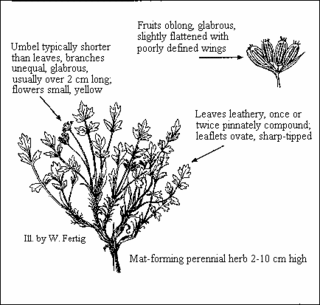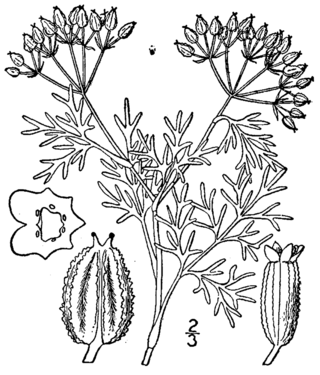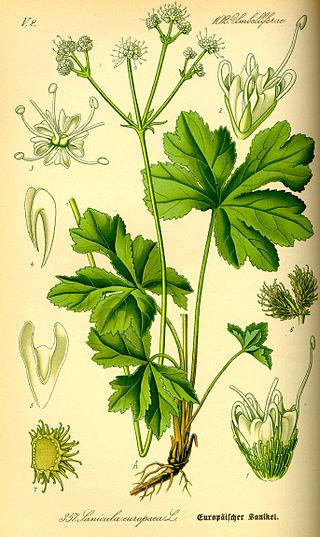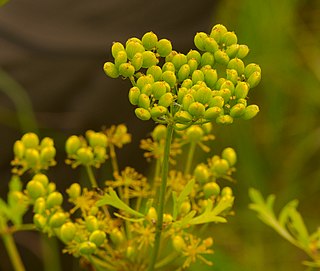
Azorella is a genus of flowering plants in the family Apiaceae, native to South America, New Zealand, southeastern Australia, and the islands of the Southern Ocean.

Lomatium is a genus in the family Apiaceae. It consists of about 100 species. Its common names include biscuitroot, Indian parsley, and desert parsley. It is in the family Apiaceae and therefore related to many familiar edible species such as carrots and celery. Native to western Northern America and northern Mexico, some Lomatium species are extensively used by Native Americans in the inland Pacific Northwest as a staple food.

Aletes has been regarded a genus of flowering plants in the family Apiaceae, all of which are endemic to North America. As of December 2022, Plants of the World Online regarded Aletes as a synonym of Cymopterus, while GRIN Taxonomy regarded it as a possible synonym of that genus.

Ammoselinum is a genus of flowering plant in the family Apiaceae, known commonly as sandparsley. It is native to temperate North and South America.

Sanicula is a genus of plants in family Apiaceae, the same family to which the carrot and parsnip belong. This genus has about 45 species worldwide, with at least 22 in North America. The common names usually include the terms sanicle or black snakeroot.

Cymopterus is a genus of perennial plants in the family Apiaceae native to western North America. They are commonly known as the spring parsleys and are edible. They are mostly stemless, taprooted perennial herbs with leaves at ground level and flowering scapes bearing yellow, white, or purple flowers.

Lilaeopsis is a genus of aquatic and riparian flowering plants in the umbel family Apiaceae, which earns them the common name 'water umbels'. Lilaeopsis are primarily found along the Pacific coast of the Americas, from southern Alaska to Tierra del Fuego and southern Patagonia, as well as the Falkland Islands and some Caribbean and Oceanic islands. One species, L. mauritiana, is found on the Indian Ocean islands of Madagascar and Mauritius.

Lomatium donnellii is a perennial herb of the family Apiaceae, in the Western United States.
Prionosciadium is a genus in the carrot family, Apiaceae. It is endemic to Mexico. The plants are biennial herbs with large taproots.

Lomatium plummerae is a formerly recognized species of plant in the family Apiaceae. When recognized, it was subdivided into a number of subspecies and varieties. As of August 2021, Plants of the World Online considers the species itself and the variety helleri to be synonyms of Lomatium donnellii, and the varieties austiniae and sonnei as synonyms of Lomatium austiniae, whereas the Jepson eFlora considers the species and the varieties austiniae and sonnei to be synonyms of Lomatium donnellii.

Polytaenia is a genus of flowering plants belonging to the family Apiaceae.
Vesper is a genus of flowering plants belonging to the family Apiaceae.
Harbouria is a monotypic genus of flowering plants belonging to the family Apiaceae. It contains just one species, Harbouria trachypleura(A.Gray) J.M.Coult. & Rose, native to the states of Colorado, New Mexico and Wyoming.
Donnellsmithia is a genus of flowering plants belonging to the family Apiaceae.

Mathiasella is a monotypic genus of flowering plants belonging to the family Apiaceae. It is in the Tribe Selineae. The genus only contains one known species, Mathiasella bupleuroidesConstance & C.L.Hitchc.
Pozoa is a genus of flowering plants belonging to the family Apiaceae.
Neonelsonia is a monotypic genus of flowering plants belonging to the family Apiaceae. It just contains one species, Neonelsonia acuminata, native to southern Mexico, Colombia, Costa Rica, Ecuador, Guatemala, Panamá, Peru and Venezuela. It is part of the tribe Selineae.

Lomatium orientale, commonly known as salt-and-pepper, eastern cous, eastern desert-parsley, eastern lomatium, white-flowered desert-parsley, oriental desert parsley or Northern Idaho biscuitroot, is a small spring blooming ephemeral plant. It grows in open habitats from the plains to foothills in western North America. It is known as one of the earliest blooming native flowers in its habitat. The species name, "orientale", is botanical Latin meaning "eastern".











